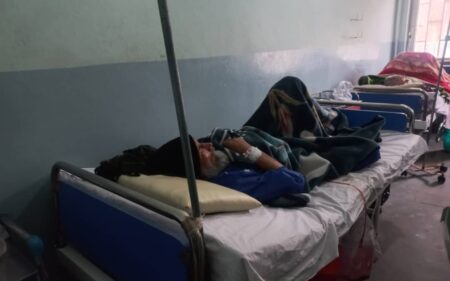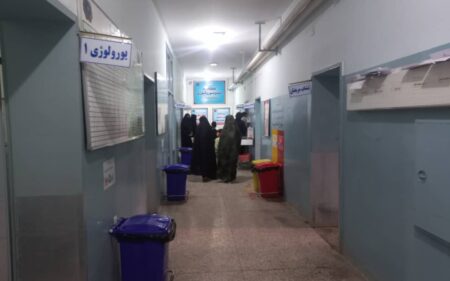Dr. Nazir Ahmad Shekaari, one of the doctors of this hospital, said that last year, 30 to 50 patients having kidney diseases visited him daily, but this year, 70 to 100 patients visit him daily.
At the same time, Dr. Ghulam Rabbani Habibi, head of the Kidney diseases department of Herat regional Hospital says, the reopening of roads and security in remote areas, are the reasons for increasing the number of patients.
He says, the excessive use of unsanitary water has caused, most people in the villages to suffer from kidney stones.
In recent years, kidney diseases have involved most of the residents of Herat province. The statistics of Herat Regional Hospital show that between 70 to 100 kidney-related patients have visited this center every day.

The officials of the Urology Department of Herat Regional Hospital say that during the last 2 years, the number of kidney patients in this department has increased unprecedentedly, compared to previous years.
Dr. Nazir Ahmad Shekaari, one of the doctors of the Kidney Department of Herat Regional Hospital, talking with Killid says, the number of kidney patients in this hospital is increasing day by day.
“Last year, we had 30 to 50 patients per day, while this year 70 to 100 patients visited the urology department.”
On the other hand, a number of patients who are hospitalized in the Urology Department of Herat Regional Hospital, talk about the high cost of treatment for this disease.
Abdul Shakoor, who is suffering from kidney disease, talking to Killid says, that neglecting the kidneys will lead to irreparable consequences.
“I have been suffering from kidney stones for 15 years. Sometimes I have severe and sometimes less pain. I took medicine several times, but my pain was relieved only for a few hours.”
This resident of Herat is satisfied with the attention of doctors, but they are concerned about the shortage of health services staff in the urology department.
At the same time, Dr. Masoud Seddiqi, the urology specialist at Herat Regional Hospital, says that factors such as congenital or acquired diseases can cause kidney stones.
“The main reason the patients involving kidney stones, is the lack of fluid in the body. The patients having kidney stones should drink enough water.”
This health official requests, that those who have kidney diseases in their families, in addition to drinking enough water and being active, should visit a doctor annually, to check their kidneys.
He also added that some patients suffering from kidney stones, come from far away areas for treatment, but they are usually very late; Because the passage of time, leads to the fact that there is no cure for them.
Factors increasing the kidney disease
The findings of the health officials in Herat Regional Hospital show that the use of polluted and unhealthy water has increased the number of people suffering from kidney disease.
Dr. Ghulam Rabbani Habibi, head of the kidney department of the Herat Regional hospital, talking to Killid said that the number of people suffering from kidney stones is increasing in hot and humid areas.
Mr. Habibi added that every year about 2,000 people in Afghanistan are suffering from kidney stones, due to improper diet and lack of drinking water.
“During the last one and a half to two years, the roads have opened, and the patients with severe kidney diseases visiting the hospital.”

The kidney department official of Herat regional hospital, says that factors such as germs, abnormal shape of the kidney in the womb, not drinking enough water, and eating fried food are the reasons for infecting with kidney diseases.
On the other hand, Dr. Masoud Seddiqi, the urology specialist at Herat Regional Hospital, says that in some cases, painkillers also cause kidney disease.
“Individuals who are severely suffering from kidney stones, do not have a healthy diet, do not have proper drinking water, and even a bacterium can cause the destruction of the kidneys for these individuals.”
The health officials in Herat emphasized the prevention of this disease and recommended that people should pay more attention to drinking water and treatment in case of problems.
Dialysis (The Purification of Blood)
In a normal state, the kidneys are responsible for purifying the blood, but when the kidneys are not working properly, this operation is done artificially, which is called dialysis.
Officials of the Hemodialysis (Blood Purification) department of Herat Regional Hospital say that the patients that their kidneys are completely destroyed, will need dialysis or a kidney transplant.
Dr. Habiburahman Habib, a specialist surgeon at Herat Provincial Hospital, says that patients who are unable to do a kidney transplant should do hemodialysis (blood purification) as long as they are alive.
“Each month we have 175 to 180 patients who need dialysis and they need to do dialysis 2 to 3 times a week.”
Dr. Habibi added that kidney-related diseases are sometimes acute and sometimes chronic (severe).
This health official reminded me that patients often visit the doctors when they are in serious condition.
“Dialysis is actually a vital thing for people whose kidneys have failed. If such patients do not undergo dialysis, they will have heart or respiratory diseases.”
When I met the people who are hospitalized in the hemodialysis department, they express dissatisfaction with the lack of blood purifiers and say that they wait for days to be given their turn.
Mohammad Sharif, one of these people, says: “We ask the government to help with kidney patients and increase the number of dialysis machines.”
These patients say that the cost of treatment is very high and they have to make an appointment for hemodialysis.
Meanwhile, the doctors in the hemodialysis department of the Herat Provincial Hospital say that currently, only 8 blood purifiers are available to them, which is not enough due to the increase in the number of patients.
Dr. Habiburahman Habib, the surgery specialist at the Herat Provincial Hospital, says:
“A patient who needs dialysis should do this action two or three times a week, and each patient should undergo dialysis for two to three hours.”
According to him, monthly between 175 to 180 people undergo dialysis in this hospital.
Increase in kidney patients
Officials of the urology department of Herat Regional Hospital say that the number of people suffering from kidney disease has increased several times this year, compared to last year.
Dr. Nazir Ahmad Shekari, one of the kidney department’s doctors at the Herat Regional Hospital, says that this hospital had an average of 30 to 50 patients per day during the last year, while this year it has between 70 to 100 patients.
Also, he says in the (IPD) or hospitalization department: “Last year, we had 60 to 70 inpatients per month, but this year between 120 to 130 patients were admitted to the urology department.”
This health official also added that there has been an unprecedented increase in the number of hospitalized patients in the urology department of the hospital in Herat.
According to doctors, dry and itchy skin, loss of appetite, frequent urination, and frothy urine with blood are the most common symptoms of kidney disease.
Translated by: Shir Ali Jafari
Follow TKG on Twitter & Facebook











